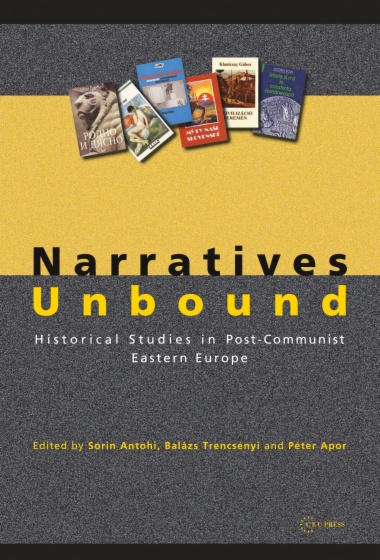The first work that covers the post-Communist development of historical studies in six Eastern European countries: Bulgaria, Czech Republic, Hungary, Poland, Romania, and Slovakia. A uniquely critical and qualitative analysis from a comparative and critical perspective, written by scholars from the region itself. Focusing on the first post-Communist decade, 1989–1999, the book offers a longer-term perspective that includes the immediate 'prehistory' of that momentous decade as well as its 'posthistoire'. The authors capture the spirit of 1989, that heady mix of elation, surprise, determination, and hope: l'ivresse du possible. This was the paradoxical beginning of Eastern European post-Communism: ushered in by 'anti-Utopian' revolutions, and slowly finding its course towards a bureaucratic, imitative, challenging, and anachronistic restoration of a capitalism that had changed almost beyond recognition when it had mutated into the negative double of Communism. Each individual chapter has numerous and detailed notes and references.
- Cover
- Title page
- Copyright page
- Contents
- Narratives Unbound: A Brief Introduction to Post-Communist Historical Studies
- Polyphonic Past: Hungarian Historical Writing in the 1990s
- 1. T he “Pre-History”: Hungarian Historiography Between 1945 and 1989
- 2. The Nineties: The Changing Infrastructure
- 3. Social History as Histoire Totale
- 4. In Search of a New Intellectual History
- 5. The Revitalization of Medieval Studies
- 6. Mentalities and Perspectives: Early-Modern Social and Political History
- 7. Between Revolution and Compromise: Political History of the Nineteenth Century
- 8. S onderweg or Nationalist Modernization? From the Turn of the Century to 1945
- 9. Jewish History and the Historiographical Debates on Anti-Semitism
- 10. The Historiographical Image of the Communist Period
- 11. Overlapping Pasts: Hungary and its Neighbors
- 12. Conclusion: Plurality Incorporated?
- Notes
- Bibliography
- From the Splendid Past into the Unknown Future:Historical Studies in Poland after 1989
- 1. Analysis of the Pre-1989 Situation
- 2. Redefinition of the Discipline Since 1990: Core Theoretical and Methodological Orientations
- 3. E veryday Life and the Social Imaginary: Medievaland Early–Modern Studies
- 4. The Shaping of Nations
- 5. Dealing with a Difficult Past: the First Half of the20th Century
- 6. From a Minefield to a Research Area: The Historyof prl
- 7. Public and Academic Debates
- 8. The Professional Community: Institutions, Associations and Publications
- 9. The Presence of Historical Studies in other Media
- 10. Funding and its Consequences
- 11. Conclusions
- Notes
- Bibliography
- A Difficult Quest forNew Paradigms: Czech Historiography After 1989
- 1. Institutional Conditions
- 2. Main Trends in Medieval History
- 3. T he History of the Early–Modern Period: From Structural History to Historical Anthropology?
- 4. In Search for ‘Societal History:’ Studies on the Long 19th Century
- 5. Between History and Politics: The Historiography of the 20th Century
- 6. The Inter-War Period: The Struggle for the ‘First Republic’
- 7. World War II and the Holocaust
- 8. Transfer or Expulsion?
- 9. The Historiography of the Communist Dictatorship
- 10. Conclusion: in Search of New Paradigms
- Notes
- Bibliography
- Wedged Between National and Trans-Nationa lHistory: Slovak Historiography in the 1990s
- 1. In Search of National History
- 2. Changes After 1989: Institutions, Research Venues, Publications
- 3. The Transition and its Characteristics
- 4. Themes and Approaches
- 5. The Plurality of Voices: Historical Regions andNationalities
- 6. Historiographical Research
- 7. Conclusions
- Notes
- Bibliography
- Mastering vs. Comingto Terms with the Past: A Critical Analysis of Post-Communist Romanian Historiography
- 1. History and Politics: The Legacy of CommunistHistoriography
- 2. History Writing After 1989: The Slow Pace of Renewal
- 3. Syntheses of Romanian History: New and Not So NeScholarship
- 4. The Demythologizing Turn
- 5. F rom the Dusk of Antiquity to the Dawn of Modernity
- 6. F rom Habsburgs and Phanariots to the First World War
- 7. Debates on Greater Romania
- 8. Interpretations of Romanian Fascism
- 9. Controversies Over the Holocaust in Romania
- 10. E thnic Minorities in Romania: Their History and Their Rights
- 11. Approaches to the Communist Past
- 12. Public Debates: History and Education
- 13. Conclusions
- Notes
- Bibliography
- Historical Studies in Post–Communist Bulgaria. Between Academic Standards and Political Agendas
- 1. Political Contexts, Institutions and Projects: 1944–1989
- 2. The Post-1989 Situation
- 3. (New) Themes and Discourses
- 4. Theoretical and Methodological Orientations
- 5. Institutional Context
- 6. The Debate on Fascism: A Case Study on the Condition and Perspectives of Bulgarian Historiography
- 7. Conclusions
- Notes
- Bibliography
- List of Contributors

